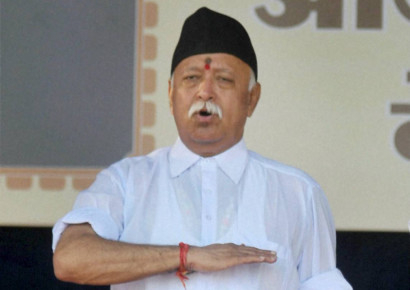
Martha Nussbaum in her book The Clash Within says the Rashtriya Swayamsevak Sangh (RSS) is possibly the most successful fascist movement in any contemporary democracy. No surprise then that liberal voices in India raised a firestorm when the country’s official broadcaster, the Doordarshan, beamed live the RSS chief’s speech on Vijay Dashami, one of the most important festivals for Hindus.
For a fiery sectarian head with fascist longings the speech in itself was unexceptionable. Neither the tone, tenor nor the contents were inflammatory. The objectionable parts were muted ever so cleverly that one could have missed them. Other than the customary homilies on banning cow slaughter, even his pronouncements on infiltration from Bangladesh did not ruffle feathers though the Bharatiya Janata Party (BJP) and its parent, the RSS, generally makes a clear distinction between Hindu refugees and Muslim infiltrators.
The RSS has evolved from its early beginnings. Its founders were undoubtedly fascinated with fascist ideology and racism, but they have since reinvented themselves. The RSS spawned the BJP primarily as its political arm while they themselves functioned as a volunteer national organisation. And the RSS has rendered years of selfless social service which even Mahatma Gandhi has acknowledged.
Simultaneously, however, they have also feathered Hindu grievances; a seething anger that has swelled over time, accusing the minorities of taking advantage of Hindu broadmindedness.
For much of the early 1990s, the BJP was untouchable. Many of the parties that later joined them in coalition governments refused to be seen in their company, but things began to change by 1995. And when Atal Bihari Vajpayee came to power for the first time in 1996 and then in 1998, the fears that the BJP would override all other considerations to run the country as a Hindu nation — a canard that the Congress party had assiduously propagated — was proven to be unfounded and the tide changed in their favour. Setting aside the 2002 Gujarat blood-letting, the Vajpayee government gave a fairly credible account of itself and assured its new-found supporters that they were not rabid Hindu rightists.
Along with this gradual mainstreaming of the BJP and its founding institution the RSS, there was this growing resentment among the Hindus that Muslim sensitivities were being unduly protected purely for electoral reasons. Take for example the infiltration problems on the eastern border with Bangladesh to which the RSS has repeatedly drawn attention to. It is a fact that successive governments at the Centre and at the state level have turned a blind eye to this inflow on account of vote-bank considerations. The demographics in these areas have undergone dramatic change. Yet, no action has been forthcoming.
Safe haven
The recent bomb blast in the Burdwan district of West Bengal is a case in point of how years of soft-pedaling issues concerning illegal immigration is finally taking its toll and the BJP has been quick to brand West Bengal under Chief Minister Mamata Banerjee as a safe haven for extremists. The truth may never come out as the National Investigation Agency has been denied access to probe the blast. Instead, Mamata has ruled that the local police should investigate the incident.
Unsurprisingly, Muslims constitute a major support base for her and by localising the probe she hopes for a cover-up. It is a given that almost all parties from the Congress to Mamata’s Trinamool Congress genuflect to minority interests. This has seen majoritarianism surge on the back of years of what the RSS has termed as appeasement of minorities.
When liberals and sections of the English media continue to lazily brand all Hindus as part of the saffron brigade, they unintentionally strengthen the RSS. Even the furore on the broadcast of the RSS chief Mohan Bhagwat’s speech is playing right into the hands of this Hindu vote bank because a bad precedent may have been set by letting a religious head use state machinery to circulate his views, but his speech was not incendiary.
On the contrary, it espoused universal values that none could take offence to. And in the past, as columnist Ashok Malek has pointed out, semi-religious celebrities like Indira Gandhi’s favourite yoga guru, Dhirendra Brahmachari, were allowed a regular slot on Doordarshan.
The RSS and concomitantly its brain child, the BJP, is riding a wave. For the moment they are unstoppable.
Ravi Menon is a Dubai-based writer, working on a series of essays on India and on a public service initiative called India Talks.











